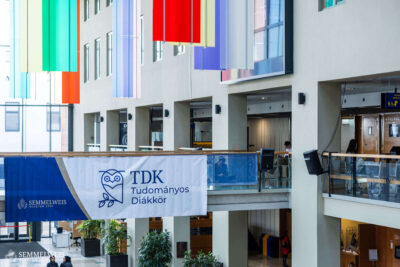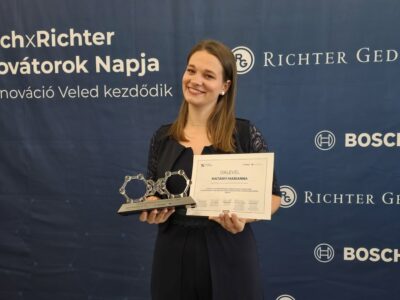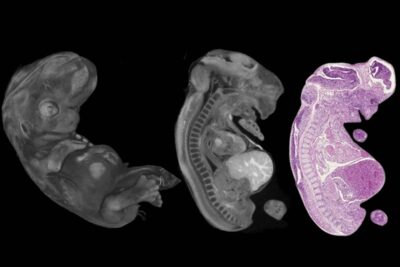The Center for Molecular Fingerprinting (CMF), led by Nobel Prize winner Dr. Ferenc Krausz, became the property of the Foundation for National Health Care and Medical Education (NEOA), which maintains Semmelweis University, on January 1, 2024. From December 1, Semmelweis University is strengthening its relationship with the researcher, who was awarded the Nobel Prize in Physics in 2023, by establishing a new joint institute. The John von Neumann Institute for Data Science, which is a research and education unit under the direct leadership of the rector of Semmelweis University, will have five research foci: molecular phenotyping, causal relationships in health information, digitization of health data, artificial intelligence, and health environment analysis. Initially, research teams will be set up in the first three areas. Within the framework of the collaboration, the joint research and scientific results produced at the new institute will be reflected in the scientific output of both CMF and the Hungarian higher education system, in particular that of Semmelweis University.
CMF’s research activity investigates the medical diagnostic applications of ultrafast measurement techniques. The center’s infrared molecular fingerprinting method can help in the early diagnosis of tumors and other serious diseases (such as cardiovascular and metabolic diseases) and contribute to the initiation of personalized treatments for a complete recovery. CMF’s activities include several medical research programs in which Semmelweis University has already been a collaborating partner.
For example, “Lasers for Life,” which focuses on cardiovascular diseases, has been running since 2020 in collaboration with CMF, Ludwig Maximilian University of Munich (LMU), and the Max Planck Institute of Quantum Optics (MPQ) in Garching, with the exclusive participation of Semmelweis University’s Városmajor Heart and Vascular Center. The newly prepared CMF program is investigating the relevance of molecular fingerprinting in lung cancer diagnostics, with the participation of Semmelweis University’s Department of Pulmonology as one of the three leading pulmonology centers in the country.
The mission of the newly established John von Neumann Institute for Data Science at Semmelweis University is to provide an innovative approach to data science; by integrating new molecular fingerprinting and profiling techniques into health datasets, it can enable a comprehensive assessment of human health and early detection of circumstances leading to serious chronic conditions. As Rector Dr. Béla Merkely pointed out:
We would like to promote the real, everyday use of a completely new testing method within the framework of the collaboration with CMF to ensure the early diagnosis and effective therapy of patients.
The ultimate goal of the research is to enable the diagnosis of diseases at an early stage by a simple blood test and, at the same time, the selection of the optimal personalized treatment, he added.
CMF’s infrared molecular fingerprinting method
Any change in health causes a characteristic change in blood composition. When a few drops of blood plasma are illuminated with ultrashort laser light, the excited molecules emit light waves that can be directly detected using attosecond laser technology. Molecular fingerprinting is thus able to capture even the smallest alterations in the molecular composition of the blood sample, which can indicate a change in the state of a person’s health. CMF was founded in 2019 and has been operating in two locations from the very beginning: Technology development and scientific research activities are carried out in Germany at Ludwig Maximilian University of Munich (LMU) and the Max Planck Institute of Quantum Optics (MPQ), while the collection, processing, and storage of blood samples, as well as the analysis of measurement data have so far been conducted mainly in Hungary, in close cooperation with the institutions involved.
The new institute will also have an educational role, with a workshop-style elective course in the undergraduate program and an interdisciplinary program in the doctoral course for students with MSc degrees in information technology, mathematics, physics, and medicine.
 “We believe and are confident that there are tremendous synergies between Semmelweis University and CMF, and that thanks to these we will be able to carry out research of international renown in the new institute, which will be of great importance for the future of both institutions,” said Dr. Ferenc Krausz, who attended the Semmelweis University Senate meeting. He also underlined the significance of training future generations of researchers who can continue to work in these fields. For this reason, he also considers it important to involve universities providing training in information technology and natural sciences.
“We believe and are confident that there are tremendous synergies between Semmelweis University and CMF, and that thanks to these we will be able to carry out research of international renown in the new institute, which will be of great importance for the future of both institutions,” said Dr. Ferenc Krausz, who attended the Semmelweis University Senate meeting. He also underlined the significance of training future generations of researchers who can continue to work in these fields. For this reason, he also considers it important to involve universities providing training in information technology and natural sciences.
Pálma Dobozi
Translation: Dr. Balázs Csizmadia
Photos by Boglárka Zellei – Semmelweis University




